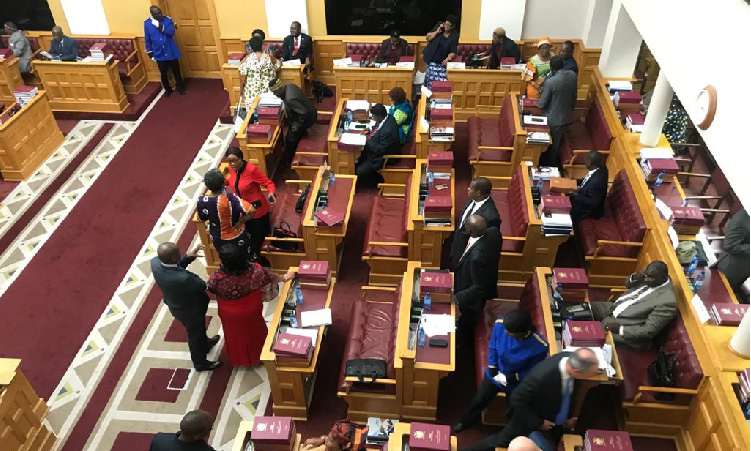THE Karas Regional Council may terminate a controversial 15-year contract signed with the Southern Electricity Supply Company (SELCo) after discovering that the company gave shares to some Council negotiators.
Newly-appointed Karas Chief Regional Officer Salmaan Jacobs confirmed in an interview with The Namibian on Wednesday that the Regional Council had enlisted the assistance of the Attorney General’s Office in reviewing the agreement. In September, The Namibian reported that several Namibian political leaders such as Jacobs’ predecessor, Joseph Stephanus, and Toivo Nampala, Councillor for the Oranjemund constituency, who is also a member of the Karas Regional Council management committee, had acquired shares in SELCo.The South African entity acquired exclusive 15-year rights to run the electricity and water networks of almost all local authorities in the South, sparking widespread unhappiness and protests from residents over escalating electricity tariffs.CONFLICT OF INTEREST Documents leaked to the media indicated that Stephanus led the Karas Regional Council’s negotiating team with SELCo and also signed the contract on behalf of the Council.According to Jacobs, the fact that his predecessor, Stephanus, negotiated and signed the contract while holding “unknown shares” in SELCo was obvious conflict of interest that disadvantaged the Regional Council.”By failing to disclose this conflict of interest SELCo acted in bad faith … the Council is not happy with this and thus enough reason to pursue the line of opting out (of the contract),” Jacobs charged.When contractual disputes started to arise, the contract was allegedly re-negotiated “secretly” by the same people late last year, but early this month the Regional Council declared it “null and void.”He also accused SELCo of breaching the agreement by allegedly charging basic fees which were supposed to be covered by the subsidy it continues to receive from the Namibian Government.”This money (the subsidy) is meant to ease the financial burden to the consumers but SELCo wrongly charges basic fees contrary to what was agreed,” the Chief Regional Officer stated.He said the subsidy SELCo draws from the Government used to range between N$80 000 to N$85 000 per month, but has recently been reduced to between N$30 000 to N$35 000 per month.Jacobs did not rule out the possibility of still salvaging the contract if SELCo was prepared to address the Regional Council’s grievances.”Unfortunately we (Council) have realised that their [SELCo’s] objectives are not compatible with ours.They see themselves as business-driven,” Jacobs noted.”What is the need of giving the contract to someone who is only business-driven without any social responsibility to the community.”Jacobs did not understand why SELCo could increase electricity charges without any major improvement to the network, “as the entire infrastructure was already in place”.SELCo Managing Director Pierre Jacobs yesterday said his company was not aware of the Regional Council’s intentions to terminate the contract.He became circumspect when asked to comment on charges that SELCo helped conceal a “conflict of interest” on the part of some officials who negotiated on behalf of the Regional Council.”Yes the matter is with the Karas Regional Council and under discussion,” he said.”The Karas Regional Council got a very good deal, they were unable to sustain the utility services at that time and were in trouble with outstanding accounts with NamWater.”(The) Karas Regional Council administration was in dire straits and they (SELCo shareholders) negotiated a very good deal for them,” the official said.The head of SELCo said it was wrong to assume that the subsidy the company received from Government was meant to ease the financial burden of electricity-users.He said SELCo rendered other services such as refuse removal, drainage services and water supply.”Due to the fact that the communities are small no one can provide the required services out of the revenue provided by the community,” Jacobs said in a statement to The Namibian.SELCo, which is listed on the Johannesburg Stock Exchange, maintained that it spent vast amounts of money to bring the infrastructure up to “reasonable standards” as it had apparently been neglected.It refuted claims that its tariffs were high, saying it had only separated the basic service fee from the prepaid cards.”Had we not done this we would have penalised consumers who consume more electricity… this is not good business practice,” SELCo declared.Aggrieved residents of some towns in the Hardap and Karas regions have already approached the Legal Assistance Centre in their efforts to have the controversial contracts, which their local authorities signed with SELCo, reviewed.A clause in the contracts also give the company the right “at any time” within 12 months of signing to exercise “a call option” to take over the operation and management of water networks.In September, The Namibian reported that several Namibian political leaders such as Jacobs’ predecessor, Joseph Stephanus, and Toivo Nampala, Councillor for the Oranjemund constituency, who is also a member of the Karas Regional Council management committee, had acquired shares in SELCo.The South African entity acquired exclusive 15-year rights to run the electricity and water networks of almost all local authorities in the South, sparking widespread unhappiness and protests from residents over escalating electricity tariffs. CONFLICT OF INTEREST Documents leaked to the media indicated that Stephanus led the Karas Regional Council’s negotiating team with SELCo and also signed the contract on behalf of the Council.According to Jacobs, the fact that his predecessor, Stephanus, negotiated and signed the contract while holding “unknown shares” in SELCo was obvious conflict of interest that disadvantaged the Regional Council.”By failing to disclose this conflict of interest SELCo acted in bad faith … the Council is not happy with this and thus enough reason to pursue the line of opting out (of the contract),” Jacobs charged.When contractual disputes started to arise, the contract was allegedly re-negotiated “secretly” by the same people late last year, but early this month the Regional Council declared it “null and void.”He also accused SELCo of breaching the agreement by allegedly charging basic fees which were supposed to be covered by the subsidy it continues to receive from the Namibian Government.”This money (the subsidy) is meant to ease the financial burden to the consumers but SELCo wrongly charges basic fees contrary to what was agreed,” the Chief Regional Officer stated.He said the subsidy SELCo draws from the Government used to range between N$80 000 to N$85 000 per month, but has recently been reduced to between N$30 000 to N$35 000 per month.Jacobs did not rule out the possibility of still salvaging the contract if SELCo was prepared to address the Regional Council’s grievances.”Unfortunately we (Council) have realised that their [SELCo’s] objectives are not compatible with ours.They see themselves as business-driven,” Jacobs noted.”What is the need of giving the contract to someone who is only business-driven without any social responsibility to the community.”Jacobs did not understand why SELCo could increase electricity charges without any major improvement to the network, “as the entire infrastructure was already in place”.SELCo Managing Director Pierre Jacobs yesterday said his company was not aware of the Regional Council’s intentions to terminate the contract.He became circumspect when asked to comment on charges that SELCo helped conceal a “conflict of interest” on the part of some officials who negotiated on behalf of the Regional Council.”Yes the matter is with the Karas Regional Council and under discussion,” he said.”The Karas Regional Council got a very good deal, they were unable to sustain the utility services at that time and were in trouble with outstanding accounts with NamWater.”(The) Karas Regional Council administration was in dire straits and they (SELCo shareholders) negotiated a very good
deal for them,” the official said.The head of SELCo said it was wrong to assume that the subsidy the company received from Government was meant to ease the financial burden of electricity-users.He said SELCo rendered other services such as refuse removal, drainage services and water supply.”Due to the fact that the communities are small no one can provide the required services out of the revenue provided by the community,” Jacobs said in a statement to The Namibian.SELCo, which is listed on the Johannesburg Stock Exchange, maintained that it spent vast amounts of money to bring the infrastructure up to “reasonable standards” as it had apparently been neglected.It refuted claims that its tariffs were high, saying it had only separated the basic service fee from the prepaid cards.”Had we not done this we would have penalised consumers who consume more electricity… this is not good business practice,” SELCo declared.Aggrieved residents of some towns in the Hardap and Karas regions have already approached the Legal Assistance Centre in their efforts to have the controversial contracts, which their local authorities signed with SELCo, reviewed.A clause in the contracts also give the company the right “at any time” within 12 months of signing to exercise “a call option” to take over the operation and management of water networks.
Stay informed with The Namibian – your source for credible journalism. Get in-depth reporting and opinions for
only N$85 a month. Invest in journalism, invest in democracy –
Subscribe Now!









